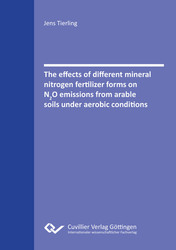| Fachbereiche | |
|---|---|
| Buchreihen (97) |
1382
|
| Nachhaltigkeit |
3
|
| Gesundheitswesen |
1
|
| Geisteswissenschaften |
2372
|
| Naturwissenschaften |
5408
|
| Mathematik | 228 |
| Informatik | 320 |
| Physik | 980 |
| Chemie | 1364 |
| Geowissenschaften | 131 |
| Humanmedizin | 243 |
| Zahn-, Mund- und Kieferheilkunde | 10 |
| Veterinärmedizin | 108 |
| Pharmazie | 147 |
| Biologie | 835 |
| Biochemie, Molekularbiologie, Gentechnologie | 121 |
| Biophysik | 25 |
| Ernährungs- und Haushaltswissenschaften | 45 |
| Land- und Agrarwissenschaften | 1005 |
| Forstwissenschaften | 201 |
| Gartenbauwissenschaft | 20 |
| Umweltforschung, Ökologie und Landespflege | 148 |
| Ingenieurwissenschaften |
1798
|
| Allgemein |
98
|
|
Leitlinien Unfallchirurgie
5. Auflage bestellen |
|
Erweiterte Suche
The effects of different mineral nitrogen fertilizer forms on N2O emissions from arable soils under aerobic conditions
Jens Tierling (Autor)Vorschau
Inhaltsverzeichnis, PDF (73 KB)
Leseprobe, PDF (100 KB)
Intensively managed agricultural soils are a major source of the greenhouse gas nitrous oxide (N2O), mainly due to the use of mineral nitrogen fertilizers which stimulate microbial processes in soils that form N2O. While oxidized N fertilizer forms can be subject to denitrification, reduced N forms must first be oxidized by nitrification to become available for denitrification. Because the contribution of these processes to N2O emissions depends on the prevailing soil conditions, the choice of the N fertilizer form has the potential to mitigate N2O emissions from fertilized soils.
The present study focused on comparing amid-, ammonium- and nitrate-based mineral fertilizers with regard to nitrogen transformation dynamics and N2O production under controlled as well as field conditions. For this two distinct methodological approaches to measure N2O emissions were evaluated and deployed. Furthermore, the effects of soil pH and the alkalizing hydrolysis of urea were investigated. It was shown that especially under aerobic conditions the N fertilizer form can significantly affect N2O production in soils, and that nitrite dynamics are important especially for nitrification-derived N2O emissions. Thus, the careful consideration of the N fertilizer form can be a measure to mitigate emissions from farmland.
| ISBN-13 (Printausgabe) | 9783736995062 |
| ISBN-13 (E-Book) | 9783736985063 |
| Buchendformat | A5 |
| Sprache | Englisch |
| Seitenanzahl | 118 |
| Umschlagkaschierung | glänzend |
| Auflage | 1. |
| Erscheinungsort | Göttingen |
| Promotionsort | Hannover |
| Erscheinungsdatum | 02.05.2017 |
| Allgemeine Einordnung | Dissertation |
| Fachbereiche |
Land- und Agrarwissenschaften
|
| Schlagwörter | nitrification, nitrite, nitrifier-deniteification |








